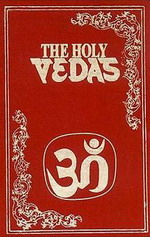The Aryans were a tribal and nomadic people whose origins may have been in the Indo-European homelands of southern Russia. Aryans were fierce warlike people who referred to themselves as noble.1 They used this term to distinguish themselves from those they conquered. Many viewed themselves as superior, and maintained this identity by being fierce. Their warlike nature allowed them to preserve their Vedic religion. Aryans believed in several gods, and they brought their religion to the regions in which they settled, namely to northern India starting around 2000 BCE. Scholars claim that the Vedic religion of the Aryans forms the basis of Hinduism.

The Aryan religion’s beliefs and practices are contained in the four Vedas: the Rig-Veda, the Sama-Veda, the Yajur-Veda, and the Atharva-Veda. The Rig-Veda, “Knowledge of the Hymns of Praise,” is the largest and oldest of the Vedas, and contains hymns to their gods. The Sama-Veda, “Knowledge of the Melodies,” contains hymns for religious rituals used as chants. The Yajur-Veda, “Knowledge of the Sacrificial formulas,” contains instructions for religious rituals and liturgy. Finally, the Artharva-Veda, “Knowledge of the Magic formulas,” was named after a kind of group of priests that cast spells against their enemies and diseases.2 Through the different Vedas, some of their gods were prayed to more than other gods, thus establishing the gods’ significance in the religion.
Although the Aryans worshiped several gods, they did not worship the same gods. Some of the gods that were worshiped in the Aryan religion were Prithivi, Indra, Surya, Vayu, and Agni. Prithivi was the goddess of the earth. Indra was the god of weather and of war. He was called the “breaker of forts” and was what the Aryan men believed a man should be like, namely, a warrior that has courage and energy. Surya was the sun god. Vayu was the god of the wind. Agni was the god of fire. He was the intermediary between the gods and humans. The Aryans believed that the god Agni ate the animals that were burned during their rituals. These sacrifices were carried out by their priests to acquire gifts from the gods, like having children, of obtaining wealth, living long, and being successful in war.3
One of the Aryan religion’s most meaningful rituals was the soma. Soma was a drink that was extracted from the celebrated soma plant described in the Rig- and Sama-Vedas. The ritual has been called the drink of the gods and the elixir of immortality. The drink was extracted from the plant by pressing or crushing the stalk of the plant using a mortar and pestle or pounding the stalks between two stones held in the hands. The extracted drink was then used as an offering to the gods or for drinking. When offered to the gods, they believed a person would gain a healthy long life, happiness, courage, strength, wisdom, and victory over enemies. When used as a drink it was believed to give the drinker understanding and creativity. The drink has also been called the procreator of thoughts as it prevents sleep and keeps the drinker awake and alert.4 The Aryan religion’s beliefs and practices have been the subject of considerable amount of research and debate. Perhaps the most debated aspect is how Hinduism developed from the Aryan religion. The Aryan Vedas are the oldest scriptures of the Hindu religion.
- Jerry Bentley, Herbert Ziegler, and Heather Streets Salter, Traditions & Encounters: A Brief Global History Volume 1, 3 edition (McGraw-Hill Education, 2013), 49. ↵
- Ancient History Encyclopedia, January 2013, s.v. “The Vedas,” by Cristian Violatti. ↵
- Ancient History Encyclopedia, January 2013, s.v. “Aryan,” by Cristian Violatti. ↵
- Encyclopedia Britannica, January 2015, s.v. “Soma.” ↵



29 comments
Engelbert Madrid
I do not remember much about the Aryans, but learning about ancient religious culture and traditions is quite interesting to learn and understand. The writer of this article seems to be fascinated with the history of this group of people and their religion based on the well-provided information that is given in the article. Therefore, I’m glad to read this and understand a little more about the Aryans.
Roman Olivera
This was a short very informative article on a subject that a lot of people don’t know a thing about. The term Aryan is used in a was today that makes it seem like a bad thing. Thank yo for informing the masses on this subject. I would have like to have tried the elixir of immortality though. it would probably be a best seller at WalMart today.
Dylan Sanchez
I loved this article, it was short and sweet. I’m a huge history and researcher of the origin of people, religions and mythological gods. I appreciated how you plugged in the origin of the people and the religion into the article. I thought it was such a weird transition that a group of people went from Russia to India (despite being nomadic). I would ask you to please explain how the religion may have died out in the end of the article ,though.
Anna Guaderrama
I remember first hearing about the Aryans and the Four Vedas while reading my favorite book series. The main character had lived many lived and her origin came from being born amongst the Aryans, whom she never lost thought about. However, I found this article quite interesting because I got to learn more about who they were and their religion. I found it fascinating how although they worshipped several gods, they didn’t worship the same gods.
Caroline Bush
Interesting article! Its really interesting to read about how the Hindi religion was based off the Aryan Veda religion. I really enjoyed the amount of detail included in this article and how they didn’t drag or make the article seem boring. I really found it interesting how the people thought that sacrifices to the gods were so important and were an essential thing. Overall I really enjoyed this article and found the topic to be very interesting.
Jose Figueroa
Not long ago in class, we discussed the Aryan people and their religion. This article helped me gain an understanding of how there religion worked and how it is similar to Hindu religion. More importantly it offered insight into there religious text and the importance of the rig veda. I found it interesting on there emphasis of sacrifice to the gods and the elixir of immortality.
Destiny Flores
Currently in class, were going over Aryan culture. We briefly went over their religion and touched on the 4 vedas. But I found this article interesting as it goes more in detail over the vedas as to what they individually consists of and represent to that culture. I found it even more interesting how it played into their rituals and how they incorporated the plant based drink into their beliefs. Much like catholics with wine.
Natalia Flores
It is interesting that the Hindu religion was based off of the Aryan Veda religion. The article was well formatted and descriptive of the Veda beliefs. I heard that the Aryan peoples, but only of their conquests. I’ve never delved into their culture or their religious beliefs and this really cleared things up for me. Though, I would love to learn more about the connection between Hinduism and the Aryan Veda religion.
Oceane Roux
Thank you for this article! I have heard of the Aryans before, but I didn’t know much about the topic. I learned a lot reading this article, and it was full of very interesting information! I always love to learn about other religions and the author did an amazing job describing it. The article is easy to follow and truly fascinating.
Manuel Aguilera
We had glossed over the Rig-Veda in class (obviously mentioning the four Vedas prior), but I had not known that each Veda was meant for something specific. I am interested in the elixir of immortality and how that perhaps empowered the soldiers to fight in wars. Also, I feel that the question brought up the idea of egotism being existent when it came to the establishing of religions as people were allowed to force their ideals on others.